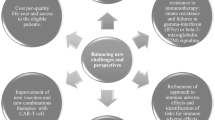Abstract.
Although surgery remains the mainstay for the treatment of most solid tumors, investigators are seeking complementary therapies to eradicate microscopic disease, which causes tumor relapse even after an apparently complete surgical excision. Although adjuvant chemotherapy has achieved some significant results, the control of minimal residual disease is still a challenge for clinicians. Among novel therapeutic approaches, immunotherapy holds promise. This anticancer strategy aims at triggering a highly specific endogenous killing machine against tumor cells. Recent progress in tumor immunology has improved our understanding of host-immune system interactions. In particular, new technologies have fostered the identification of potentially immunogenic tumor antigens that can be used as suitable targets for immune effector cells. After observing immunotherapy-mediated clinical responses in patients with metastatic disease, investigators have started evaluating this anticancer modality in the adjuvant setting. Here, we review the immunological strategies so far explored in humans and report worldwide results following the clinical application of adjuvant immunotherapy for solid tumors.
Similar content being viewed by others
Author information
Authors and Affiliations
Additional information
Electronic Publication
Rights and permissions
About this article
Cite this article
Mocellin, S., Rossi, C.R., Lise, M. et al. Adjuvant immunotherapy for solid tumors: from promise to clinical application. Cancer Immunol Immunother 51, 583–595 (2002). https://doi.org/10.1007/s00262-002-0308-0
Received:
Accepted:
Issue Date:
DOI: https://doi.org/10.1007/s00262-002-0308-0




